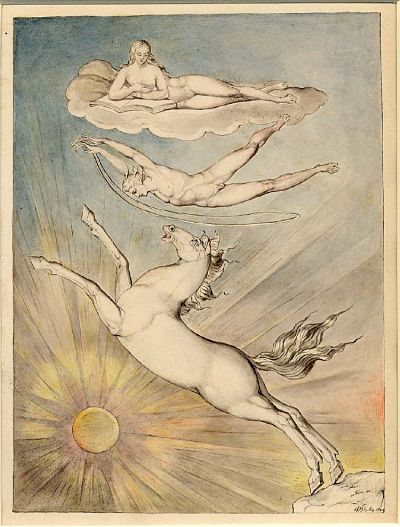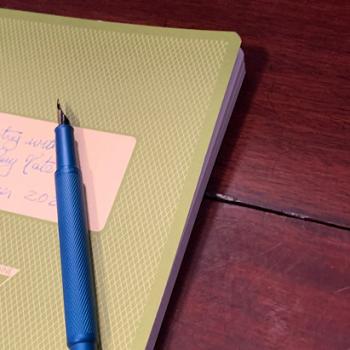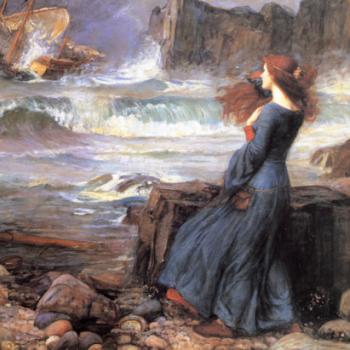
The most pathetic of political partisans is the man who hopes his hapless candidate will turn out better than he has reason to believe he or she will. They hope to vote for what seems to be a vulgarian and then have an angel drop down from the clouds.
This will not happen.
Shakespeare tells us why in Henry IV, Part I.
This seems an odd thing to assert, since in this play Hal, the future Henry V, has hidden his greatness. He is friend to Falstaff and thieves. He is a drunk, an apparent thief, and no gentleman.
His father is ashamed of him and he is unfit to wear the crown. Yet Hal over the course of the play shows that his degeneracy is a sham. He hides his greatness so that it can “burst forth” when he becomes King.
He will win greater honor because England has such low expectations. Imagine a potential leader who is crude, has foolish friends, and bad manners.
One can only hope as a friend of the family that this bad lad is better than his behavior and like a miracle, Hal is. This becomes the snare and delusion for England. It dooms the nation to the War of the Roses and to misery. Hal is a wastrel, but Hal becomes Henry V, the hero. He defeats his youthful counterpart, Henry Hotspur, and as King he will win at Agincourt.
This friend of thieves, shady men, and drunkards proves that while bad company generally corrupts good morals, it does not always. Hal is the exception that deludes the fools. He is a great man who uses the bad men to hide his greatness.
England will endure decades of misrule by Henry V (Hal’s) foolish son (Henry VI), civil war, and ruin, hoping for Henry V. After all, if one drunk can be a great man why can’t this loser also be a great man?
This is foolish, but a great temptation.
No matter how good advice is, there are exceptions. When students come to ask me what to do, I remind them that no matter what I say sometimes things will not work out . . . or even more improbably, things will work out even if you do everything wrong. You can do all the wrong things and have the luck to be happy. You can do all the right things and have the bad luck to be miserable.
Why?
God is keeping score for eternity and we are looking at this life. Hal is made small by his friendship with Falstaff and the other wastrels. He drinks with them, but he is also using them. He hides his glory in the shadow of their vice, so he can burst from the clouds as a great man. This works, but he is made less by it. He uses people for greatness and that can never be done with cheapening any “win.’
Shakespeare gets reality, Christian reality. Nobody is “good” and nobody is “bad.” We are all souls created in the image of God: good. We are all broken and selfish: bad. Every human is an incomprehensible mix of good and bad and this makes predicting outcomes impossible.
Some seeming drunks are heroes like Hal in the making, yet almost all the rest are Falstaff. A man like Shakespeare’s John Falstaff is funny, until you have serious business.
Let’s be plain: Americans hope that they can vote for a seemingly unqualified person and get Abraham Lincoln. Why? Lincoln was the least qualified person to ever be President, but also our greatest President. Abraham Lincoln was hidden by poverty, but became great.
He is a snare and delusion just now.
Most unqualified Presidents, become Dewey not Lincoln.
Shakespeare understands that some are better than their seeming choices . . . and can rise to be great. He also understands that “hiding” greatness can consume greatness until nothing is left.
We need good leaders, but we cannot make these two basic mistakes:
We must look for great leaders everywhere.
Character matters and life choices in the past (generally) point to outcomes in the future. Bad company (generally) corrupts good morals.
Except when it does not.
God help us to find heroes, even in unexpected ways, but God show us that generally great men come from great communities.
Nobody is perfect, but some are better than others. Sometimes God has mercy and a great leader (Hal) drops down from the clouds. Mostly, we get what we expect.
In a Republic, we should never vote for the wastrel, the crook, or the drunk, but we can hope (against hope) that if we must vote for the wastrel, the crook, and the drunk that things will turn out better than we deserve.
They sometimes do.
———————————————————-
William Shakespeare went to God four hundred years ago. To recollect his death, I am writing a personal reflection on a few of his plays. The Winter’s Tale started things off, followed by As You Like It. Romeo and Juliet still matter, Lady Macbeth rebukes the lust for power, and Henry V is a hero. Richard II shows us not to presume on the grace of God or rebel against authority too easily. Coriolanus reminds us that our leaders need integrity and humility. Our life can be joyful if we realize that it is, at best, A Comedy of Errors. Hamlet needs to know himself better and talks to himself less. He is stuck with himself so he had better make his peace with God quickly and should stay far away from Ophelia. Shakespeare gets something wrong in Merchant of Venice . . . though not as badly as some in the English Labour Party or in my Twitter feed. Love if blind, but intellectualism is blind and impotent in Love’s Labours Lost. Brutus kills Caesar, but is overshadowed by him in Julius Caesar. We should learn not to make Much Ado about Nothing. We might all be Antony, but if we would avoid his fate then we must avoid flattery and the superficial love of Troilus and Cressida. We are fools, but our goal should be to accept it and not to degenerate into Biblical fools during our Midsummer Night’s Dream. Richard III is a symptom of a bad leadership community, but be careful that use Measure for Measure to guide your reaction to the mess. The modern university is Iago in Othello playing on our sins to destroy the nation. You can’t accumulate your way to a great leader and personal piety in Henry VI (Part I) is not enough to make a great king. God will save the King, not our stupid partisan squabbles seen in Henry VI (Part 2) and not kingmakers as existed in Henry VI (Part 3). Fortunately, in God’s world All’s Well That Ends Well. Two Gentlemen remind me that being in love is grand. King John keeps winning and so loses. Slander always gives way to truth in Cymbeline. We need patrons, but God help us if we flatter them and lose them as Athens did with Timon of Athens. We need good leaders and not have to hope against reason that one turns out well like young Prince Hal in Henry IV Part One.
















